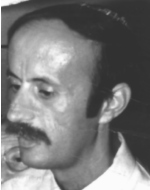Ivy, Elijah (Elik)
Son of Rachel and Shlomo. He was born on February 1, 1946, in the city of Lares, in Spanish Morocco, where he began his studies in elementary school and acquired knowledge in Spanish, French and English, and immigrated to Israel with his family in 1956. He settled in Moshav Barak in the Jezreel Valley, In August 1963, he was drafted into the IDF’s compulsory army service, and at the end of basic training he was sent to a wireless communications course, a profession that fascinated him And he excelled in it. Eliahu underwent parachuting training and in 1965 was sent to a course for liaison officers. After successfully completing the course he was promoted to the rank of lieutenant colonel and assigned to the Golani Brigade, first as deputy company commander and later as company commander, during the Six Day War he participated in battles in Jenin, Nablus and the Golan Heights. He married Aya and moved to Haifa (a city he loved very much) and in 1970 his only son, Assaf, was born in the Suez Canal and after the war he was promoted to Major and was appointed a division liaison officer. In early 1974 Maya was divorced. In the course of his service, he was posted as the commander of an electronic communications officers course and head of the training unit at the training base. In 1978, he served as battalion commander, and in the same year he was discharged from the army and went to civilian life to raise his son. In 1984 he returned to the regular army, was promoted to the rank of lieutenant colonel and was appointed head of training for radio and electronic units. That year he married a wife again-Liora. In 1986 he contracted severe kidney disease and was hospitalized. Despite his difficult illness, he tried to continue to fulfill his role until his forces did not stand up and then went to study at the University of Haifa as part of the army. When his illness became worse and his life was in danger, his doctors decided to transplant kidneys and he was registered independently and without assistance in three hospitals in Israel and in a hospital in Belgium, but he did not receive it. On the first day of Hanukkah, Eliyahu fell during his service. He was forty-two when he died. He was laid to rest at the military cemetery in Haifa. In a condolence letter to the family, his commander wrote: “Elyak was a professional officer, dedicated to his work, and his demands were high and suited to his principles in the areas of command and execution.
